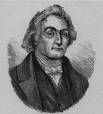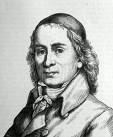 George Whitefield
George Whitefield (1714-1770), British Calvinist evangelist and, according to
Arnold Dallimore, the primary fuel for the spread of 18th-century
Methodism (even more than
John Wesley), says this:
"It is true, we may flatter ourselves, that supposing we continue in our natural corrupt state, and carry all our lusts along with us, we should, notwithstanding,
relish heaven, was God to admit us therein. And so we might, was it a Mahometan paradise, wherein we were to take our full swing in sensual delights. But since its joys are only spiritual, and no unclean thing can possibly enter those blessed mansions, there is an absolute necessity of our being changed, and undergoing a total renovation of our depraved natures, before we can have any
taste or
relish of those heavenly pleasures. It is, doubtless, for this reason, that the apostle declares it to be the irrevocable decree of the Almighty, that ‘without holiness, (without being made pure by regeneration, and having the image of God thereby reinstamped upon the soul,) no man shall see the Lord.’ And it is very observable, that our divine Master, in the famous passage before referred to, concerning the absolute necessity of regeneration, does not say, Unless a man be born again, he
shall not, but ‘unless a man be born again, he
cannot enter into the kingdom of God.’ It is founded in the very nature of things, that unless we have dispositions wrought in us suitable to the objects that are to entertain us, we can take no manner of complacency or satisfaction in them. For instance, what delight can the most harmonious music afford to a deaf, or what pleasure can the most excellent picture give to a blind, man? Can a tasteless palate relish the rich dainties, or a filthy swine be pleased with the finest garden of flowers? No: and what reason can be assigned for it? An answer is ready: Because they have neither of them any tempers of mind correspondent or agreeable to what they are to be diverted with. And thus it is with the soul hereafter: for death makes no alteration in the soul, than as it enlarges its faculties, and makes it capable of receiving deeper impressions either of pleasure or pain. If it delighted to converse with God here, it will be transported with the sight of his glorious majesty hereafter. . . ."
"The sum of the matter is this: Christianity includes morality, as grace does reason; but if we are only mere moralists, if we are not inwardly wrought upon, and changed by the powerful operations of the Holy Spirit, and our moral actions proceed from a principle of a new nature, however we may call ourselves Christians, we shall be found naked at the great day, and in the number of those who have neither Christ’s righteousness imputed to them for their justification in the sight, nor holiness enough in their souls as the consequence of that, in order to make them meet for the enjoyment, of God.”
--“On Regeneration,” in George Whitefield,
Sermons on Important Subjects (London: Henry Fisher, 1832), 547-550.
"[B]efore you or I can have any well-grounded, scriptural hope, of being happy in a future state, there must be some great, some notable, and amazing change pass upon our souls. I believe, there is not one adult person in the congregation, but will readily confess, that a great change hath past upon their bodies, since they came first into the world, and were infants dandled upon their mothers’ knees. It is true, ye have no more members than ye had then; but how these are altered! Though you are in one respect the same ye were, for the number of your limbs, and as to the shape of your body, yet if a person that knew you when ye were in your cradle, had been absent from you for some years, and saw you when grown up, ten thousand to one if he would know you at all, ye are so altered, so different from what ye were, when ye were little ones. And as the words [of Matt. 18:3] plainly imply, that there has a great change passed upon our bodies since we were children, so before we can go to heaven, there must as great a change pass upon our souls; our souls considered in a physical sense are still the same, there is to be no philosophical change wrought upon them; but then, as for our temper, habit, and conduct, we must be so changed and altered, that those who knew us the other day, when in a state of sin, and before we knew Christ, and are acquainted with us now, must see such an alteration, that they may stand as much amazed at it, as a person at the alteration wrought on any person he has not seen for twenty years from his infancy."
--“Marks of a True Conversion,” Whitefield,
Sermons, 270.
 Charles Hodge (1797-1878), American Presbyterian theologian of Princeton Seminary:
Charles Hodge (1797-1878), American Presbyterian theologian of Princeton Seminary: Thomas Chalmers
Thomas Chalmers


 George Whitefield
George Whitefield

 John Wesley
John Wesley August Hermann Francke
August Hermann Francke
 Matthew Henry
Matthew Henry

 John Howe
John Howe Henry Scougal
Henry Scougal Stephen Charnock
Stephen Charnock